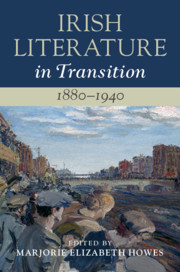Book contents
- Irish Literature in Transition, 1880–1940
- Irish Literature In Transition
- Irish Literature in Transition, 1880–1940
- Copyright page
- Contents
- Contributors
- Series Preface
- General Acknowledgements
- Chapter 1 Introduction
- Part I Revisionary Foundations
- Part II Revolutionary Forms
- Part III Major Figures in Transition
- Chapter 10 Ageing Yeats: From Fascism to Disability
- Chapter 11 ‘I myself delight in Miss Edgeworth’s novels’: Gender, Power and the Domestic in Lady Gregory’s Work
- Chapter 12 Synge and Disappearing Ireland
- Chapter 13 Drumcondra Modernism: Joyce’s Suburban Aesthetic
- Chapter 14 London Irish: Wilde, Shaw and Yeats
- Part IV Aftermaths and Outcomes
- Part V Frameworks in Transition
- Index
Chapter 14 - London Irish: Wilde, Shaw and Yeats
from Part III - Major Figures in Transition
Published online by Cambridge University Press: 28 February 2020
- Irish Literature in Transition, 1880–1940
- Irish Literature In Transition
- Irish Literature in Transition, 1880–1940
- Copyright page
- Contents
- Contributors
- Series Preface
- General Acknowledgements
- Chapter 1 Introduction
- Part I Revisionary Foundations
- Part II Revolutionary Forms
- Part III Major Figures in Transition
- Chapter 10 Ageing Yeats: From Fascism to Disability
- Chapter 11 ‘I myself delight in Miss Edgeworth’s novels’: Gender, Power and the Domestic in Lady Gregory’s Work
- Chapter 12 Synge and Disappearing Ireland
- Chapter 13 Drumcondra Modernism: Joyce’s Suburban Aesthetic
- Chapter 14 London Irish: Wilde, Shaw and Yeats
- Part IV Aftermaths and Outcomes
- Part V Frameworks in Transition
- Index
Summary
Thus Bernard Shaw, in a well-known statement from the Preface to his first, long unpublished novel, Immaturity, reflected on his decision to leave Dublin for London in 1876 at the age of 20. It was a retrospect written with the hindsight of almost fifty years: ‘There was no Gaelic League in those days, nor any sense that Ireland had in herself the seed of culture’. Such a view might well reinforce the impression that Shaw, like Wilde immediately before him, belonged to that older tradition of Irish dramatists – Farquhar, Goldsmith, Sheridan, Boucicault – who could only imagine success in metropolitan terms.
- Type
- Chapter
- Information
- Irish Literature in Transition, 1880–1940 , pp. 246 - 262Publisher: Cambridge University PressPrint publication year: 2020

